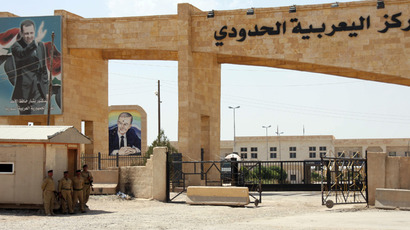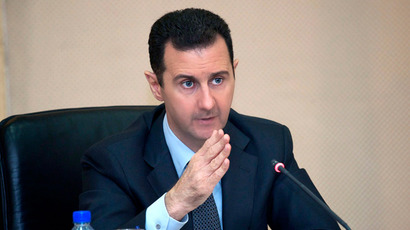21 UN peacekeepers taken hostage by Syrian rebels in Golan Heights
Syrian rebels have seized twenty UN peacekeepers in the Golan Heights on the border between Syria and Israel. The United Nations Security Council demands the convoy’s immediate release.
A young fighter saying he was from the "Martyrs of Yarmouk" said
the peacekeepers would not be set free until Syrian government
forces withdrew from the village of Jamlah, a mile east of the
ceasefire link with the Israeli-occupied Golan, Reuters
reports.
"If no withdrawal is made within 24 hours we will treat them as
prisoners," he said, claiming the UN forces had collaborated
with Syrian government troops to drive the fighters out of the
village.
After a video appeared on YouTube showing several armed-rebel
fighters standing in front of two white armored vehicles bearing
the UN inscription with at least five peacekeepers inside, the UN
confirmed the incident.
UN deputy spokesman Eduardo del Buey told reporters that
"approximately 30 armed fighters stopped and detained about 20
peacekeepers within the area of limitation."
"The UN observers were on a regular supply mission and were
stopped near Observation Post 58, which had sustained damage and
was evacuated this past weekend following heavy combat in close
proximity, at Al Jamlah," the United Nations said in a
statement issued in New York.
The UN Security Council demanded the peacekeepers immediate
release. Russia’s UN envoy Vitaly Churkin said the seizure of the
UN observers showed “gross disrespect for the United
Nations.”
“Right now there are negotiations between UN representatives
and the captors and we hope that the [UN] personnel will be
released immediately as the UNSC demands,” Churkin
said.
Mentioning an attack on Monday which killed 48 Syrian servicemen and nine Iraqi law enforcers, Churkin said the Golan incident showed “some people are trying very hard in order to extend the geography of the Syrian conflict.”
Human Rights watch said it was investigating the same rebel brigade for its role in a videotaped execution of detained Syrian soldiers posted on the Internet on Tuesday.
The capture of the UN observers points to how the situation on
the ground in Syria is getting out of control and all sides are
unable to control armed groups on the ground, Karl Sharpo, a Middle
East blogger, told RT. He further warned that that there is no way
of knowing whose hands outside aid will end up.
“The lines on the ground are very fluid, distinctions don’t really
apply and you can’t make sure the weapons end up in the intended
sites. Again if you look at the fact at what this incident
illustrates is the lack of control that any military authority on
the ground for the opposition or an outside political authority,
doesn’t exercise the control it says it does,” Sharpo said.

The incident follows a statement on Wednesday by the Arab League
offering military support
to the Syrian rebels. Previously the League had only offered to
support the Syrian opposition via humanitarian and diplomatic
assistance.
Arab League Secretary-General Nabil Elarby told a press
conference the Syrian Opposition Coalition had been formally
invited to send a representative to attend a league meeting to be
held in Doha in April.
The UK Foreign Secretary William Hague also announced on Wednesday that Britain will increase non-lethal aid to anti-government forces in Syria. The $19.5 million dollar package will include armored vehicles, body armor, search and rescue, disease prevention and communication equipment.

The Russian Foreign Ministry announced last week that any decision to send aid to rebel fighters would intensify the two year Syrian civil war by encouraging “extremists to seize power by force.”
Shortly after Israel warned the UN Security Council it could not be expected to “stand idle” as the Syrian civil war expands beyond its borders, while Churkin said that armed groups operating out of the Golan were undermining regional security.
“It’s of course something very dangerous they are doing by staging armed activity from that area. It’s something which can undermine security between Syria and Israel. So whoever is supporting that kind of activity or approving it tacitly is playing a very dangerous game,” Churkin warned back on Monday.

Israel captured the Golan Heights from Syria during the 1967 war. The country agreed to return the land to Syria in return for a peace agreement that was rejected by the Arab world.
During the 1973 Yom Kippur War, Syrian forces crossed the
ceasefire line into the Golan Heights in an attempt to retake the
territory. Syria's troops were repelled by Israeli forces.
Israel annexed the Golan in 1981, though they returned about 5 percent of the territory to Syria. The land was merged into a demilitarized zone that is currently patrolled by UN peacekeeping forces.














